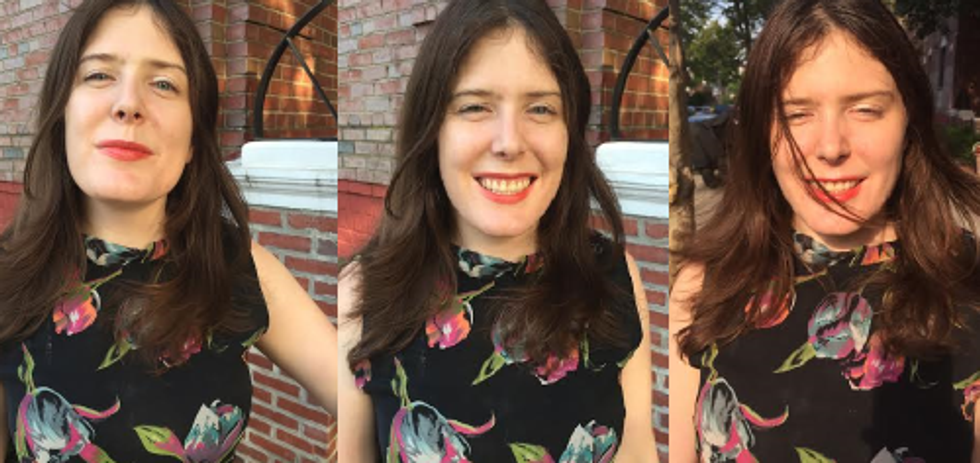Showbiz
Dina Rickman
Aug 11, 2015

Here's something most people won't admit about sex: they're not having that much of it either.
Research has found 16-44 year olds are having less sex every year, and this trend isn't just reduced to Britain: a study of American teenagers released in 2015 found most millennials had fewer sexual partners than their parents.
No one knows this better than 32-year-old author and journalist Rachel Hills, who started writing her book The Sex Myth: The Gap Between Our Fantasies and Reality as a 24-year-old virgin.
Eight years on and more than 200 interviewees later, The Sex Myth has just been published. We spoke to the now-married, New York based author to find out more.
So why did you start writing the book?
It was a point in my life, in my early 20s, when I felt particularly uncomfortable with my sex life. I felt quite bad about the fact that I wasn't having any [sex] rubbed up against my self-perception as this vibrant, interesting, hopefully attractive person - although nobody can ever be too sure of that when it comes to themselves - and this idea that we all live in a culture where we're told that everybody is having sex, particularly if you're young and vaguely attractive. The fact that my life didn't look like that made me think "maybe there's something wrong with me".
But I also felt frustrated and annoyed that there wasn't a narrative that existed in the media to make sense of my experiences. There wasn't a way you could just be a normal girl or a normal woman and not be having sex, at that point in time.
How do you think the gap between what we're told by the media and what we actually experience changes the way we think about our sexuality?
It fuels a culture where people feel inadequate. Not just because we're told that people are having sex all the time, on the one hand, and on the other hand we're told that sex with too many people is dirty and wrong and if you do it with too many people you're also a terrible person. What we do when it comes to sex matters really profoundly: this idea that sex is a window into our desirability, into the quality of our relationships, into how likable we are to be around, into our politics. That has the effect of making any deviations from the norm when it comes to sex feel really weighty.
Does the media make it impossible to be moderate?
Moderation is considered a bit boring. The media does [ignore moderation] in part because that's what people want to hear. It's reflected in the stories we tell about ourselves as well. There's this line in the book where I talk about being at university: we tell people about the three weekends you did hook up, not the 49 you didn't. That's partly because they make more interesting stories.
And then there are traps?
On the one hand we're told everyone is having sex and they should be having it to be a successful human being but on the other hand people are punished for being too sexual - if you're having sex with too many people that's not considered very moral or very 'clean'.
What surprised you when you were writing the book?
The first surprise I had was that so many people reached out to me wanting to talk about the ways they felt different, or the ways the current media narrative was inaccurate or inadequate. That other people felt the same dissatisfaction that I felt, for different reasons than me.
The other was the realisation that people whose sexual experiences or histories seem very different to mine on the surface - so for example people who might identify as kinky, or who were polyamorous, women who self-identified as sluts - my pain point was feeling like my sex life wasn't interesting enough. It was really eye-opening for me to realise that people who I perhaps idealised in my head or thought couldn't possibly understand what it's like to be me had similar feelings of shame and uncertainty.
Are we very neurotic about sex in different ways?
There's going to be a selection bias there, people who are feeling a sense of discomfort are more likely to get in touch with me. I think many people are feeling neurotic about sex. I was primarily speaking to younger people, in their 20s. Your 20s is a decade when you're figuring a lot of things out, and where sex fits into your life is one of them. Most people - not me - most people lose their virginity in their teens. But I think the point at which you're grappling with what sex means on an emotional and identity level is probably more in your 20s. I think the point in which you feel bad is any point your sex life deviates from the norm.
What's the message you want to send to anyone worried about their sex life?
The message I want to send to people is there are many more ways to have a good sex life that the dominant narrative suggests - and that it is normal to go through different phases in your sex life. Rather than having one single story of what is a good or acceptable sex life, we need to be more comfortable with variety.
More: Rachel Hills' personal website
More: 11 of the worst sex tips women's magazines have given their readers
Top 100
The Conversation (0)
x















